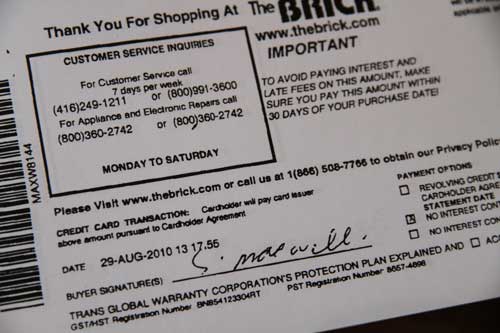This past summer some guy stole more than $20,000 worth of stuff by pretending he was me, and this event makes me worried for our country. The thief didn’t break into my house physically, but was granted access to my financial identity by a telephone banking operator who failed to exercise diligence. What I know now may save you some of the time and grief it cost me to clean up the kind of home security mess that’s becoming more and more common.
 It started when an overly-trusting telephone banking rep at a major Canadian institution allowed a thief to change the billing address on my credit card, even though this guy couldn’t answer any of my personal security questions. Seven days later, he called the credit card company again, asking for a replacement card, claiming his current one was damaged.
It started when an overly-trusting telephone banking rep at a major Canadian institution allowed a thief to change the billing address on my credit card, even though this guy couldn’t answer any of my personal security questions. Seven days later, he called the credit card company again, asking for a replacement card, claiming his current one was damaged.
On the morning of Saturday, August 28th, with our shiny, new Steven Maxwell credit card in hand, the thief bought thousands of dollars worth of stuff before using my card to get other new cards that he filled to the limit. He bought lunch for himself, gassed up his car and spent a weekend at a hotel and gambling casino.
Thirty six hours later, a guy from the credit card company called me, wondering why my spending patterns were so different than usual. That’s when the work and worry began. As I quickly discovered, the entire Canadian credit industry is link together as one organic unit. When fraudulent activity enters one part of your credit life, it spreads to all other parts like a virus. The fictitious address and telephone number provided by the thief immediately made their way to my credit records, even to the point where I had to quote this erroneous information just to gain access to correct my own records.
If anything like this ever happens to you, here’s what you need to do. Start by calling both of the two credit rating agencies in Canada – Equifax (www.equifax.ca; 866.828.5961) and TransUnion (www.transunion.ca; 800.663.9980). Let them know you’ve been the victim of identity theft, and they’ll take a verbal report. You’ll also need to verify your corrections in writing later on, accompanied by photocopied and notarized proof of your authentic information. Follow up directly with the various card companies and cell phone providers involved in fraudulent claims made in your name.
Next — and this is important — call the Canadian Anti-Fraud Centre (www.phonebusters.com; 888.654.9426). This division of the RCMP takes a report of your incident to substantiate your claims that fraudulent charges don’t apply to you.
The best news to come out of all this is that I was never in any danger of being financially responsible for the thefts done in my name. And while that’s good for me, it’s sad and puzzling for Canada. As I discovered during my mop-up work, credit crimes are on the rise – sad proof that the moral fiber of this country isn’t what it used to be. Thirty five years ago the entire credit card industry functioned just fine on nothing but trust and mechanical carbon imprint sliders. Now even our digitally interconnected credit system is regularly breached, and that makes me wonder. Why does the banking industry allow credit fraud to continue when technological options exist to prevent it?
In South Africa, for instance, every time you attempt to use your bank card or credit card, an automated call goes through to your cell. If you don’t key in your secret access code into the phone, the transaction won’t go through. I guess neither the money lost nor the thousands of hours spent by individual Canadians fixing up their tattered credit lives is incentive enough to implement something more secure than the patchwork system of chip-equipped cards we’ve got now. Perhaps if more of us realized how much the Canadian financial system relies on the kind of old-fashioned trust that’s dwindling fast, effective protection measures might appear.